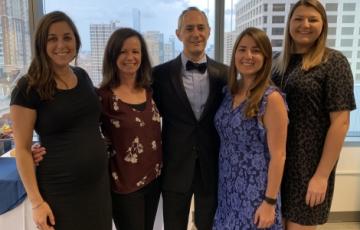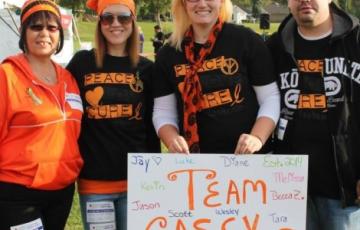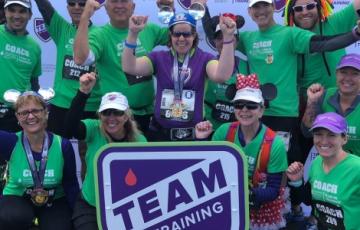Search Results

Brian
Our family has once again joined the fight to beat leukemia and lymphoma together with the support of The Leukemia & Lymphoma Society (LLS). I am a cancer survivor who comes from a family that, for three generations, has had eight family members with solid tumors or blood cancers. We understand cancer; we will never give up the fight.

Preston
Preston was a regular 12-year-old kid who loved being active and was obsessed with playing basketball. He got sick in August and was still having a hard time recovering in late September. We realized he needed a thorough check-up and decided to bypass the doctor’s office and go directly to the ER. He had been extremely lethargic and was losing weight. His lips were pale, and his body was cold to the touch.
Bishoy
Leukemia Survivor Travels From Egypt to Receive Treatment
At just three years old, Bishoy’s parents uprooted him and his family from Egypt to America after he was diagnosed with acute lymphoblastic leukemia. He underwent treatment for most of his childhood until finally receiving a clean bill of health at thirteen years old.

Michael
I’m Michael and I’m a two time leukemia survivor. My story is the force that drives me, fuels my energy, and led me to challenge myself to jump rope 1,000,000 skips in 2020. I’m doing it to bring awareness to blood cancer and raise money for LLS. When I heard, “Michael, we have your blood test results. We’ve arranged for your hospital admittance. Please go there now,” I thought ”This can’t be right”. Two days later on Thanksgiving, I had my diagnosis – hairy cell leukemia.

Aiden
Aiden and his identical twin brother, Mason, were born perfectly healthy at 37 weeks. They were great babies and were rarely ever sick. They hit all their milestones on time and were thriving. When they were 2½ years old, I started looking into preschools in the area to begin their education.

Elmer
Hey, I appreciate the work of The Leukemia & Lymphoma Society (LLS). I did the Facebook fundraiser in honor of my friend Mr. Larry in Florida who is now in remission after being diagnosed with leukemia. He’s a dear friend of mine, and he has a lot of courage and determination to beat this illness. I wanted to do this to help raise money for LLS and for all those who face an uncertain future. I’m planning to do 31 days instead of just 21 because I feel many people exceeded their miles per day in very cold conditions while I just walked mine inside on the job where I walk a lot.
Diagnosis
Diagnosing juvenile myelomonocytic leukemia (JMML) usually involves ruling out other similar diseases such as chronic myelomonocytic leukemia and chronic myeloid leukemia, especially if your child is older than 6 years. Doctors commonly use blood tests and bone marrow tests to diagnose JMML.
The tests used to diagnose JMML include:
CMML Subtypes
Most people diagnosed with chronic myelomonocytic leukemia (CMML) have one of three different subtypes of CMML. Doctors classify CMML subtypes by the percentage of blast cells ("blasts") in the blood and bone marrow.
Doctors use a classification system developed by the World Health Organization (WHO) in 2001 and updated in 2016. The three subtypes are:
Chemotherapy and Drug Therapy
If you're being treated for chronic myelomonocytic leukemia (CMML), your first line of defense may be drug therapy. You'll be given potent drugs that must be toxic enough to damage or kill the cancer cells. At the same time, these drugs take aim at normal cells and cause side effects. Yet, not everyone experiences side effects and people react differently.
Drugs Used for CMMLThere is no one standard treatment for CMML. There are three FDA approved treatments for patients, which include:

Judy
Meet Judy, a leukemia survivor, and teacher. Given a death sentence of chronic myeloid leukemia (CML), Oregon native Judy prepared to have her ashes scattered on Mt. Hood. But her participation in the phase one clinical trial for the miracle drug Gleevec® gave her a new life.
Doug
On July 16, 2014 I had just finished eating out at our local diner. When standing at the register to pay, my defibrillator fired and an ambulance was called. Within two hours of arriving at the emergency room I found out I had leukemia. I had had no symptoms other than the lab work that showed the disease. I was in disbelief when I heard the words "very aggressive form of acute promyelocytic leukemia (APL)." By the next afternoon I was started on a heavy regiment of arsenic and ATRA chemotherapy treatment.
Johanna
I am a teacher from Texas. My journey to Team and Training wasn’t immediate. I moved to Texas from Louisiana. When I moved to Texas, I decided to start running to meet people and to help with my homesickness.

Dorothy
Dorothy Spriggs was diagnosed with chronic myeloid leukemia (CML) in 1999 and is currently doing well.
Since 2011, “Ms. Dottie” has volunteered with the Baltimore chapter of The Leukemia & Lymphoma Society. She does office work regularly, participates in events and volunteers as a peer counselor to support others living with the same diagnosis.

Gary
My stepdad Gary passed away from leukemia on October 18, 2023. He began feeling ill in September 2023 ― lightheaded and dizzy. He took himself to the hospital, and after several weeks of testing, he was diagnosed with acute myeloid leukemia (AML) on October 3. He was told he could do treatment, and there was a chance to beat it. He and my mom went to the hospital the next morning to start treatment. On this morning, October 4, the doctor told them that it was a rare variant, acute erythroid leukemia, and there really weren’t any treatment options.

Forest
In September 2017, our world crashed when I was diagnosed with acute lymphoblastic leukemia (ALL). Over the next several years, I experienced numerous chemotherapy sessions, radiation treatments, a stem cell transplant, many side effects, infections, and another cancer. There were moments when I felt near death. Despite these difficulties, our Christian faith was a source of strength and hope throughout this journey. We decided to write a book about our faith journey through leukemia.

Janet
I support LLS because leukemia and lymphoma has impacted my family. On Mother’s Day in 2006, my cousin's six year-old daughter, Sydney was diagnosed with acute myeloid leukemia (AML). After a year of fighting so hard, Sydney passed away.
The doctors at the New York Hospital were amazed and acknowledge that because Sydney did not give up and she fought such a painful battle, she had done so much for the advancement of research in leukemia.
Signs and Symptoms
Signs and symptoms vary from patient to patient and depend on the type of CMML. Click here to learn more about subtypes of CMML.
Those with a myelodysplastic subtype (MD-CMML) tend to present with low blood cell counts. Signs and symptoms may include:
Chuck
Meet Chuck a leukemia survivor. He is the Indianapolis Colts Head Coach, "My condition was leukemia. But my position was, I'm walking out of here. For everybody who's battling this disease, for everybody who's going to battle this disease, I would just say, look, your attitude's got to be one of, I'm gonna beat it."
Diagnosis
An accurate diagnosis of the type of leukemia is important. The exact diagnosis helps the doctor to estimate how the disease will progress and determine the appropriate treatment
Diagnosing acute myeloid leukemia (AML) and your AML subtype usually involves a series of tests. Some of these tests may be repeated during and after therapy to measure the effects of treatment.
Refractory and Relapsed Childhood AML
Refractory AML: Some patients have residual leukemia cells in their bone marrow even after they receive intensive treatment for AML. In these cases, the disease is referred to as “refractory” (or “refractory AML”). Less than 15 percent of children have refractory AML.

Casey
It was in May, 2014 that 24-year-old Casey Moore began experiencing her first symptoms of chronic myeloid leukemia (CML). For a week straight, Casey had been vomiting every day and was losing a significant amount of weight. This was unusual, as prior to her symptoms, she considered herself a happy, healthy woman focused on her relationship and career. At the time, she was living with her boyfriend and working full time in a chiropractic office -- with no apparent signs of an illness.

Georgia
Today I would like to give thanks to The Leukemia & Lymphoma Society. With the fantastic staff, and volunteers we have truly come so far. As an ALL survivor, Team In Training Alumni, and participant it is so amazing to see what we have all done for blood cancer patients and their families.

Christal
My brother was diagnosed with acute lymphoblastic leukemia (ALL) in September 1996 and passed away in April 1997, his senior year of high school and less than a month after turning 18. As a young person watching my brother suffer through his cancer diagnosis and subsequent death, it took away pieces of me that I will never get back. Not only me but my parents, his friends, our church, and strangers alike. Throughout the years, I have felt exhausted in grief as I denied my feelings, only to be hit by it in full force in unexpected moments.

Tony
It was 40 years ago that Tony was diagnosed with acute lymphoblastic leukemia (ALL) at age 2. Back then, the disease wasn't very well understood, and the technologies and treatments didn't have a great deal to offer. It was a rough road, but Tony managed to make it through with the help of his mother and many experimental drugs. He went through chemotherapy, radiation, spinal taps, and hair loss, and at age 12, his doctors couldn't find any trace of leukemia.